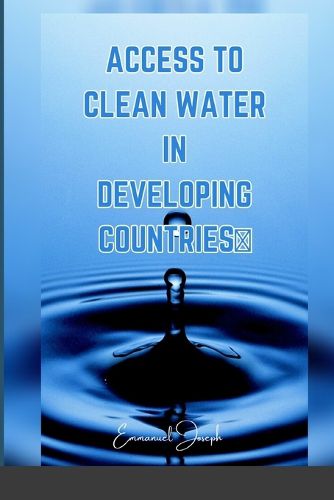Readings Newsletter
Become a Readings Member to make your shopping experience even easier.
Sign in or sign up for free!
You’re not far away from qualifying for FREE standard shipping within Australia
You’ve qualified for FREE standard shipping within Australia
The cart is loading…






This title is printed to order. This book may have been self-published. If so, we cannot guarantee the quality of the content. In the main most books will have gone through the editing process however some may not. We therefore suggest that you be aware of this before ordering this book. If in doubt check either the author or publisher’s details as we are unable to accept any returns unless they are faulty. Please contact us if you have any questions.
"Access to Clean Water in Developing Countries: Addressing the Ongoing Crisis" is an insightful and comprehensive book that delves into the critical issue of access to clean and safe drinking water in many parts of the world, with a specific focus on developing countries. Through twelve chapters, it provides a deep exploration of the challenges, solutions, and implications associated with the global water crisis.
This book begins by setting the stage, discussing the current state of water access, challenges faced in various regions, and the impact on daily life. It then delves into the health impact of waterborne diseases, the sources of water contamination, and the critical role of water quality.
Chapters are dedicated to examining the various types of water sources used in developing countries, including surface water, groundwater, and unimproved sources, and the challenges associated with each. The text further explores the deficiencies in water infrastructure and the barriers to access, such as economic constraints, distance, and technological limitations.
Governmental and non-governmental initiatives are highlighted, showcasing the role of international organizations, donor countries, and NGOs in addressing water access challenges. Case studies illustrate successful projects and lessons learned.
The book doesn't stop at the challenges; it also explores community-led solutions and technological innovations. It discusses emerging technologies for water purification, low-cost solutions, and the importance of community involvement in finding local, sustainable solutions.
Economic and social implications of water access are discussed in detail, emphasizing the impact on agriculture, productivity, healthcare, gender empowerment, and overall well-being. The text recognizes water as a fundamental human right and addresses the issue of inequality and disparities in water access.
The book concludes by looking toward the future, offering recommendations for policies, international collaboration, education, and sustainability. It emphasizes the importance of collective action in ensuring that clean water becomes a fundamental human right for all.
"Access to Clean Water in Developing Countries" is a valuable resource for policymakers, researchers, humanitarian organizations, and anyone interested in understanding and contributing to the critical global issue of clean water access.
$9.00 standard shipping within Australia
FREE standard shipping within Australia for orders over $100.00
Express & International shipping calculated at checkout
This title is printed to order. This book may have been self-published. If so, we cannot guarantee the quality of the content. In the main most books will have gone through the editing process however some may not. We therefore suggest that you be aware of this before ordering this book. If in doubt check either the author or publisher’s details as we are unable to accept any returns unless they are faulty. Please contact us if you have any questions.
"Access to Clean Water in Developing Countries: Addressing the Ongoing Crisis" is an insightful and comprehensive book that delves into the critical issue of access to clean and safe drinking water in many parts of the world, with a specific focus on developing countries. Through twelve chapters, it provides a deep exploration of the challenges, solutions, and implications associated with the global water crisis.
This book begins by setting the stage, discussing the current state of water access, challenges faced in various regions, and the impact on daily life. It then delves into the health impact of waterborne diseases, the sources of water contamination, and the critical role of water quality.
Chapters are dedicated to examining the various types of water sources used in developing countries, including surface water, groundwater, and unimproved sources, and the challenges associated with each. The text further explores the deficiencies in water infrastructure and the barriers to access, such as economic constraints, distance, and technological limitations.
Governmental and non-governmental initiatives are highlighted, showcasing the role of international organizations, donor countries, and NGOs in addressing water access challenges. Case studies illustrate successful projects and lessons learned.
The book doesn't stop at the challenges; it also explores community-led solutions and technological innovations. It discusses emerging technologies for water purification, low-cost solutions, and the importance of community involvement in finding local, sustainable solutions.
Economic and social implications of water access are discussed in detail, emphasizing the impact on agriculture, productivity, healthcare, gender empowerment, and overall well-being. The text recognizes water as a fundamental human right and addresses the issue of inequality and disparities in water access.
The book concludes by looking toward the future, offering recommendations for policies, international collaboration, education, and sustainability. It emphasizes the importance of collective action in ensuring that clean water becomes a fundamental human right for all.
"Access to Clean Water in Developing Countries" is a valuable resource for policymakers, researchers, humanitarian organizations, and anyone interested in understanding and contributing to the critical global issue of clean water access.